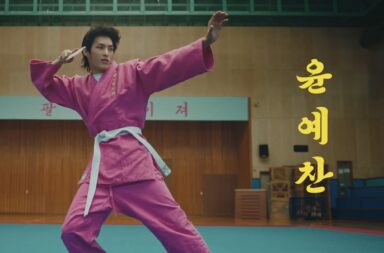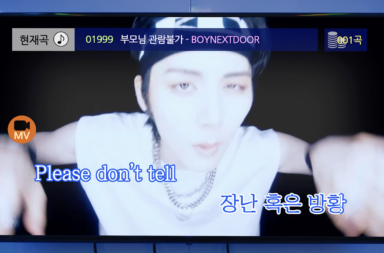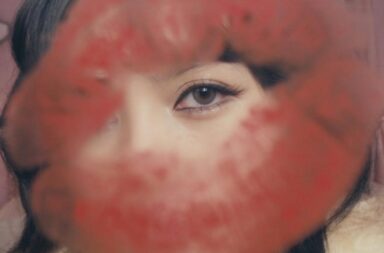March and April showers usually bring May flowers, but in the world of K-pop, these months often usher in a slew of seasonal bops ahead of the warm season. Rookie groups Alice and Epex took this route, as well as veteran artist Bol4 with her cozy comeback “Friend the End.”
The other side of spring, meanwhile, brought tracks reverberating with the rock revival. Giuk of the RBW Entertainment band Onewe made his solo debut; NCT’s ever-busy all-rounder Mark released the cuttingly witty “Golden Hour” through the NCT Lab project; and Agust D (aka Suga of BTS) delivered his highly anticipated third solo album D-Day and the emotionally raw B-side “Amygdala.” So buckle up, and get ready to experience the dichotomy K-pop of these recent releases have to offer.
Alice — “Show Down”
Alice, formerly known as Elris until they moved companies and rebranded last year, came back on April 19 with their chaebol crush-tinged MV “Show Down.” Although powerhouse girl group IVE popularized this “chaebol crush” concept, it is clearly catching on in K-pop. The five members of Alice channel this idea as they establish themselves as role models in “Show Down.” They are music producers crushing the stage; determined and sculpted boxers; passionate dancers; and the picture of luxury with shopping bags draped across their arms (and a sports car entrance).
Styling-wise, Alice are on top of all the recent trends. They don plaid cropped blazers, mini skirts, and dresses à la school girls; wear bold denim-on-denim looks; and flaunt their healthy, glowing skin—a K-pop idol signature look. Together with the upbeat production of “Show Down,” Alice show off everything they are and can be. They are role models for the shy girl who admires them on social media, but they are also, in the end, a friend to her, too.
Epex — “Sunshower”
Going from a debut album with “anxiety” in the title to a comeback centered around love and “sunshowers” is growth. And something rookie group Epex underwent. With almost two years under their belt, the eight members of Epex are clearly ready to take another step of maturity. The funny thing is “Sunshowers,” the title track of their latest album Prelude of Love: Chapter 2. ‘Growing Pains,’ is probably the most bright and upbeat lead single in their discography to date.
The feel-good summer track opens its equally delightful MV, which opens with a brass theme reminiscent of classic black and white movies. One might wonder how a song like “Sunflower” relates to the anxiety theme in their discography; however, the first verse clears up any confusion. Epex sing, “What is this anxious feeling, / a feeling like a lag screen / What shall I do” as they impatiently wait for a response from their crush. Although the MV is nothing new, mostly featuring Epex and their choreography with a few solo shots dispersed in between, the members’ cheeky energy and playfulness make the watching experience memorable. Plus, the bassline and the minor step in the chorus add an attractive edge to the bright confession that is “Sunshower.”
Bol4 — “Friend the End”
Bol4’s seven years of music is filled with cozy songs such as “To My Youth” and “New York,” among others. However, frontwoman Ahn Ji-young still brings something new to usher in the hopefulness of spring in her newest track, “Friend the End.” The MV tells a sweet story through a rosy lens, the blossoming cherry blossom motif accompanying this blossoming young love. Bol4 welcomes spring in her Bol4 way, a delicious electric guitar hook forming the foundation of “Friend the End.”
The MV also brings the beloved friends-to-lovers trope to K-pop, cutting between the two main characters as school friends and as adults returning for a reunion (or a similar event). However, spring and its cherry blossoms—and love—are in the air. From getting pushed together on the bus thanks to an influx of high schoolers to drawing birds on a secluded wall at their school, the two characters realize their young love began when they were last at this place full of their good memories together.
Giuk (Onewe) — “Time Machine (2100)”
Onewe, the brother band to Oneus and labelmates of Mamamoo, had quite the 2022. With Planet Nine: Voyager, the follow-up to their 2021 EP Planet Nine: Alter Ego, Onewe entered a new era. Emotion-filled concerts, a Battle of the Bands opportunity through Mnet’s Great Seoul Invasion, and reflective, timeless singles characterized their year. The band also released their first English album Gravity in January ahead of Yonghoon and Kanghyun, the two eldest members, enlisting in the military. The five of Onewe have always stuck together—starting from their days as M.A.S. 0094—so it was a (pleasant) surprise when RBW Entertainment announced that their youngest was releasing a solo album.
Rapper, bassist, composer, songwriter, and maknae Giuk stepped into his own artistic spotlight with Psycho Xybernetics : Turn Over on April 20. (Although he used to go by the stage name CyA, he recently changed it to Giuk, his given name.) Giuk has uploaded unofficial solo music on Soundcloud in the past and even helped create its cover art; however, Turn Over and its lead single, “Time Machine (2100),” feel particularly “Giuk.” Situated firmly in the rock lane, Giuk’s solo album takes the skills and sounds he has honed with Onewe—which tend to be more rock-ballads—and mixes them with his distinct energy.
The MV for “Time Machine (2100)” shows this best. Dramatic silhouettes of Giuk highlight his new soloist status and the increased space he now takes up. “Time Machine” also leans into a futuristic concept, as three Giuks throughout time search for one girl. Meanwhile, he enthusiastically brings into his youthful energy and his penchant for experimentation through the styling and makeup seen in “Time Machine (2100).” Loose fitting pants tucked into army-esque boots, baggy jackets, and flowing tops are Giuk’s deceptively simple styling choices. While these elements fit the futuristic rocker theme, his accessories—like the beading details in his hair—and makeup decisions draw the focus back to his face. As a true Gen Z K-pop artist, Giuk keeps a pulse on recent beauty trends, like adding gems underneath his right eye and applying heavier, rosier blush to his cheeks. A very stylish rebel, indeed.
Mark — “Golden Hour”
Mark has a sense of humor, which is much beloved by NCTzens. In his latest NCT Lab project, the versatile rapper takes a roast from Gordon Ramsay and spins it quite literally into gold. In 2018, Gordon Ramsay responded to an NCTzen’s tweet about their “boyfriend’s” scrambled egg attempt, saying, “Get back on Tinder!” Now five years later, Mark released the aptly titled “Golden Hour.” The track and its MV mash together a golden hour-esque palette, unpredictable production, and clever, tongue-in-cheek lyrics penned by Mark with a rap-rock foundation. Eggs—and their “golden yolk in the middle”—form the key focus of this track.
What had been only a joke among NCTzens has now been revived in full force thanks to “Golden Hour” and Mark’s humor. The MV reflects the chaos and playfulness of the song, like Mark repeatedly slamming a raw egg onto a rock barely 30 seconds in, the noticeable ants view perspective, and the subtle—and sometimes not-so-subtle—imagery of egg yolks. Lyrics such as “I don’t know how to make eggs / But that I do not stress / ‘Cause I’ve never been hungry” are Mark to a tee, capturing his confidence and ability to see a new side in negativity.
Mark’s warm makeup, the yellows and gold hints in his styling, and the sunshine sets also add a captivating visual aspect to the auditory feast that is “Golden Hour.” Touches of complementary cool blues, including the frosty contacts Mark dons for the MV, make the video that more alluring. Somehow it all works, despite its glorious odd-ness—from the playful lyrics, including the sound similarities between “callin’ Gordon out” and “golden hour,” to the papier-mâché creatures featured in the MV.
Agust D – “Amygdala”
Content warnings: self-harm, suicide ideation
On the other side of the color spectrum is Agust D’s “Amygdala.” A monochrome palette stands in stark contrast to the vividness of the rapper’s emotions. While we don’t hear Agust D utter “amygdala” until two minutes into the song, the track takes its title inspiration from the small, almond-shaped part of the brain that helps regulate emotions and activates the fight-or-flight responses when confronted with fear, stress, or other threats.
The MV revolves between two sets: a small street intersection and a simple set of a couch and a door engulfed by pitch-black darkness. In the MV, Agust D, the soloist moniker of BTS’ main rapper Suga, pours his traumatic experiences and his depression into “Amygdala.” Through the melodic rap track, he faces his listeners bare-faced, open hearted, and emotionally raw. Just like the superstar sings, “So, is all this countless suffering for my own good?” Above any stage name or celebrity status, Min Yoongi is human.
He remembers and relives his shoulder injury, as his scooter crashes into the car again and again. This, alongside his mother’s heart surgery, his father’s liver cancer diagnosis, and his history of depression, sends him over an edge. Life tumbles and tumbles and tumbles until it becomes almost unbearable to deal with. Agust D represents this struggle between living and his depression through being trapped in a room, alone. The main point of his focus, however, is a free-standing door that sometimes seems to taunt him and sometimes seems to provide the comfort of knowing there is a way out. At one point, the whole room tips until it’s vertical, with Agust D clinging for dear life. He doesn’t seek to provide any answers in “Amygdala;” instead the song and the MV are Agust D’s way of saying, “I understand.” and “You’re not alone.”


